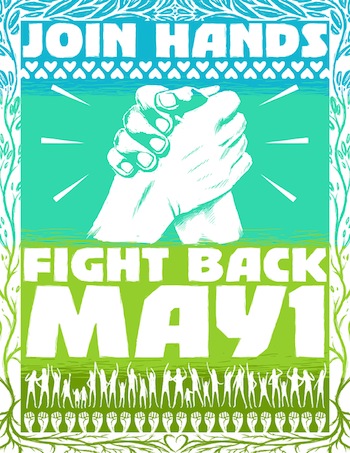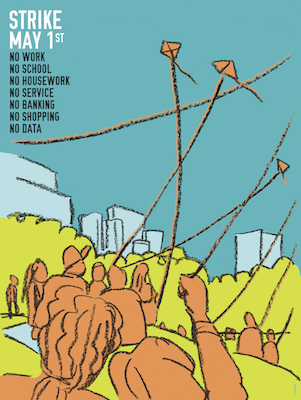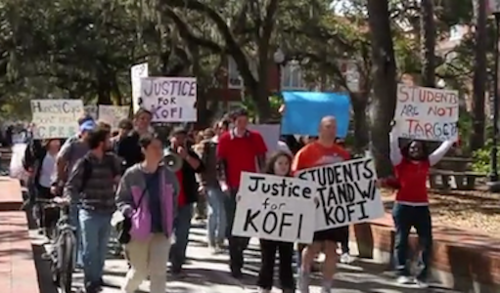Re-posted from Occupy 2012. Why do we strike on May Day? What is that strike? We strike in solidarity with global labor, our own histories and with each other. The action of striking is not just a withdrawal of labor but … Continue reading “Striking New Relationships”
Category: Topics
Back to the Big Apple
Ashley DawsonItaly was really great, but it’s so good to be back in NYC! Today I walked through Union Square, which is filled with tables distributing information for Occupy May Day. There’s a very exciting series of events planned, as well … Continue reading “Back to the Big Apple”
Striking New Relationships
Nicholas MirzoeffWhy do we strike on May Day? What is that strike? We strike in solidarity with global labor, our own histories and with each other. The action of striking is not just a withdrawal of labor but what Marina Sitrin calls “striking new relationships.” The actions of refusal to play the part expected of us, in whatever way we can, and imagining other ways of relating to each other are what will constitute a day of generally striking, a striking day.
Take Artists Space: Dissensus and the Creation of Agonistic Space
Andrea Liu“What does it mean to be uninvited?” This is the question Benjamin Buchloh posed in response to the work of Christopher D’Arcangelo exhibited at Artists Space in October 2011. D’Arcangelo created unauthorized anarchist interventions into the gallery and erased … Continue reading “Take Artists Space: Dissensus and the Creation of Agonistic Space”
On Fear, Theory, and Acting Anyways
Hannah Chadeayne AppelIt has been through my participation in Occupy that I’ve first come to feel my citizenship, not in the narrow national sense, but in a broader sense of intentional political subjectivity in the world. Through my adult life I’ve voted, … Continue reading “On Fear, Theory, and Acting Anyways”
In His Own Home
Malini Johar SchuellerIn His Own Home (Dir. Malini Johar Schueller & Luce Capco Lincoln): On March 3, 2010, campus police at the University of Florida, responding to a 911 call from a neighbor and colleague who heard screaming next door, broke into … Continue reading “In His Own Home”
Siding with the dispossessed: Interview with Jacqueline Aquino Siapno
Neferti X. M. TadiarJacqueline Aquino Siapno (Joy) is originally from Dagupan City, Pangasinan, Philippines and is married to Fernando `Lasama’ de Araujo, Presidential Candidate in Timor Leste (East Timor) and current President of Parliament. Joy Siapno is the author of Gender, Islam, Nationalism … Continue reading “Siding with the dispossessed: Interview with Jacqueline Aquino Siapno”
Siding with the dispossessed: Interview with Jacqueline Aquino Siapno
Social Text CollectiveJacqueline Aquino Siapno (Joy) is originally from Dagupan City, Pangasinan, Philippines and is married to Fernando `Lasama’ de Araujo, Presidential Candidate in Timor Leste (East Timor) and current President of Parliament. Joy Siapno is the author of Gender, Islam, Nationalism and … Continue reading “Siding with the dispossessed: Interview with Jacqueline Aquino Siapno”
Kony 2012: Inaudible Children
Tavia Nyong'oCan the subaltern speak? No, but she can certainly sob, with tears of raking loss and, a few rapid film cuts later, tears of heartwarming gratitude. I learned that much watching Kony 2012 this morning, even if, like most people from the … Continue reading “Kony 2012: Inaudible Children”
Revolutionary Expertise?
Hannah Chadeayne AppelAs the New York Occupy movement goes on, it also spreads out. 16 Beaver, Charlotte’s place, and the Atrium of 60 Wall Street (now home to General Assemblies), remain nodes in the occupied downtown real estate network, but the overwhelming … Continue reading “Revolutionary Expertise?”
Why the Question of Palestine is a Feminist Concern
Neferti X. M. TadiarI was recently part of a fact-finding delegation to Palestine organized by the US Academic and Cultural Boycott of Israel. The delegation was composed of concerned academics and scholars based in the U.S., including myself. During our weeklong investigative trip, we were witness to multiple and varied testimonies to and clear evidence of the daily acts of violence, harassment and humiliation that Palestinians are subjected to, both massive and intimate. Individuals from several families living in Eastern Jerusalem told us their personal stories of being physically thrown out of their homes in the middle of the night, their houses pillaged and taken over by settlers (many of whom were only recently residents of the U.S.), their belongings strewn onto the streets only to be looted by morning, their children targeted to bear recurring nightmares of the punishing character of their eviction (being made to see, for example, the displayed burning of their dolls alongside that of their beds).
Arab Talk Interview: Nikhil Pal Singh on Palestine
Nikhil Pal SinghArab Talk Host Jess Ghannam interviews Professor Nikhil Singh about his recent trip to Palestine sponsored by the USACBI.
Occupying Gender in the Singular Plural
Tavia Nyong'oCall me a sissy, but I’ve never particularly cared for being referred to as cisgender. Still, the work of transgendered activists within Occupy Wall Street has been one of things that keep me optimistic. At a November 13th teach-in at Zuccotti Park, just days before the brutal eviction, trans activists took over the people’s mic for an hour-long lesson in occupying gender, educating their non-trans listeners on the unearned privileges we enjoy whenever we conform to ascribed gender; outlining the work that groups like the Sylvia Rivera Law Project have long been engaged in, against police violence and medical pathologization; and outlining pragmatic and principled tactics for an occupation open to trans and cis-gendered people alike.
People Before Process: the Bureaucracies of Anarchy Pt. 2
Hannah Chadeayne AppelSometime in early October I showed up to an OWS organizer’s meeting at 16 Beaver Street. 16 Beaver, like 56 Walker or Charlotte’s Place, is one of these magically anachronistic spaces in lower Manhattan that feel like something out of Patti Smith’s Just Kids — free space for art, activism, and organizing, embedded in some of the most expensive real estate in the world. Of course, to label these spaces “anachronistic” is to cede to capital its totalizing power.
We interrupt this dispatch … Occupy Oakland and the General Strike!
Hannah Chadeayne AppelI didn’t realize how claustrophobic Wall Street’s Liberty Park was until I arrived at my home Occupy in Oakland. Rather than the jumble of tarp-covered shelters that grew and morphed rhizome-like through Liberty Park, Occupy Oakland’s colorful tents felt positively … Continue reading “We interrupt this dispatch … Occupy Oakland and the General Strike!”






